Overview
The Easy Red 2 Scripting System is an optional add-on that allows you to create new game modes and customize missions as well as AI and soldier behaviors. It works alongside the default Mission Editor and enables you to:
- Script mission phases to create new objective types (e.g., destroy a specific vehicle, eliminate a particular unit, reach a destination, trigger explosions, etc.).
- Script soldiers and AIs to control behavior, disable functionalities, force actions, or even trigger in-game dialogue.
The system leverages Lua, meaning you have access to all standard Lua features like tests, loops, functions, and conditions. For general Lua language documentation, please refer to the Lua Documentation.
For Easy Red 2–specific Lua commands and further examples, check out our dedicated scripting wiki.
Important Tools
While making your scripts, you might need some extra data to use in your scripts such as Ids to spawn vehicles, acquire vanilla loadouts, spawn items, acquire vanilla and modded factions.
- You can acquire string Ids from the Id tables section in the Script Settings. By selecting any object you'll copy it's Id into the clipboard.
- You might also need to acquire 3D world positions. You can copy a vec3(...) world position for lua code by pressing P.
A vec3(...) position will be acquired from cursor position and copied into the clipboard to use it in your code.
Scripting Mission Phases
It is possible to run a script at the beginning of each mission phase. The script starts executing when the phase begins and is interrupted when a new phase starts or when it has finished executing. If a previously run phase is started again, the script will run once more.
Within the Mission Editor UI, you will find a script button:
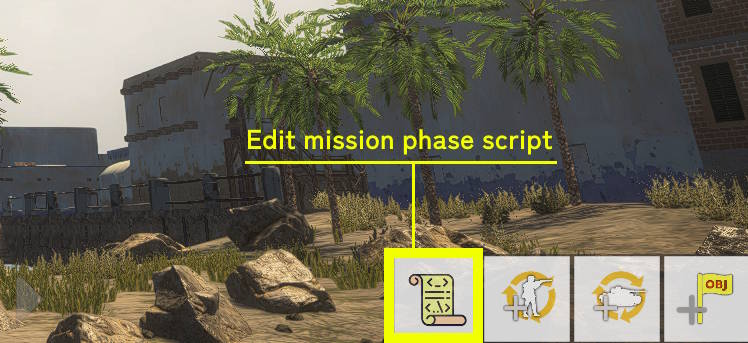
Clicking this button opens a code editor that allows you to edit the script for the current phase. To save your changes, simply close the editor by clicking the red cross:
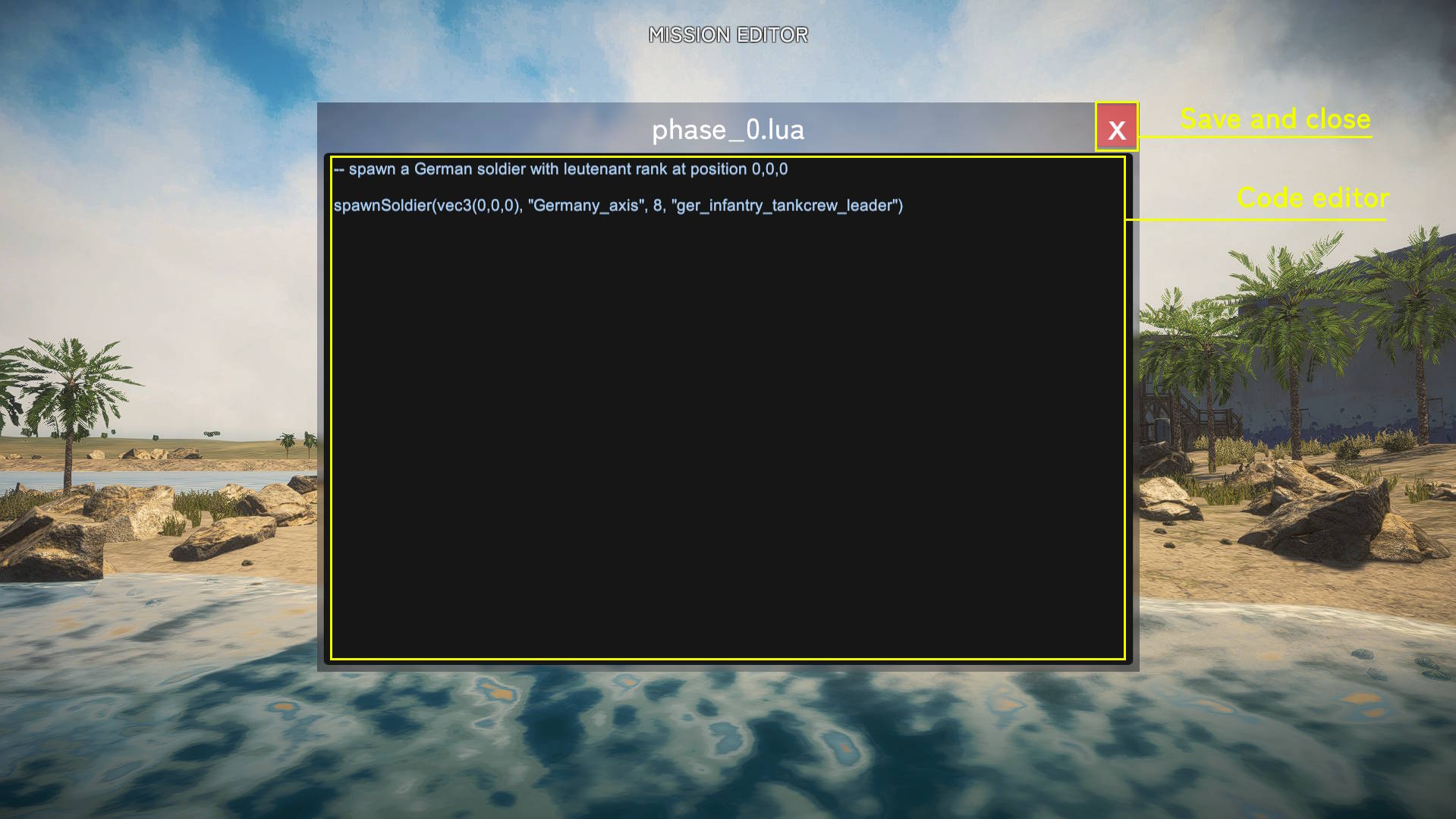
Additionally, scripts are stored in a dedicated subfolder of the mission folder. This allows you to edit them using an external code editor if you prefer:

When playing offline, your machine runs all the scripts. In online matches, the phase script runs on the master client only, although most scripting commands generate actions synchronized across all players.
Note: If the master client leaves, a new one is assigned and the phase script will run from the beginning on that machine. For this reason, it is recommended to use the global class to set global variables that keep track of the phase state, ensuring that operations already performed are not unnecessarily repeated.
Below is an example of a mission phase script:
-- Mission Phase Script Example
-- check if a certain "target_spawned" global boolean variable have been set already;
-- If not, then the script is running for the first time in this phase
-- and we want to do the initialization actions, like spawning targets
if not global.get("targets_spawned") then
print("Spawning targets to eliminate...")
-- Perform targets spawn operations here ...
-- Next, set the "targets_spawned" to true,
-- so if this script will run again* we know that this action has performed.
global.set(true, "targets_spawned")
-- *Why could the script run again?
-- Phase script is executed every time the phase starts (or re-start)
-- or whenever the host has changed
end
-- Example of main phase loop
local phaseCompleted = false
while not phaseCompleted do
sleep(3) -- always recommended to put some wait time on every loop!
if checkTargetsStillAlive() then -- dummy function
phaseCompleted = true
end
end
--loop is done so continue with next phase...
er2.nextPhase()Scripting AI & Soldier Behavior
In addition to mission phases, you can script the behavior of AI and soldiers. This is done through the Script Editor where you can create, edit, and delete AI scripts.
In the Script Editor, navigate to the Script Settings menu:
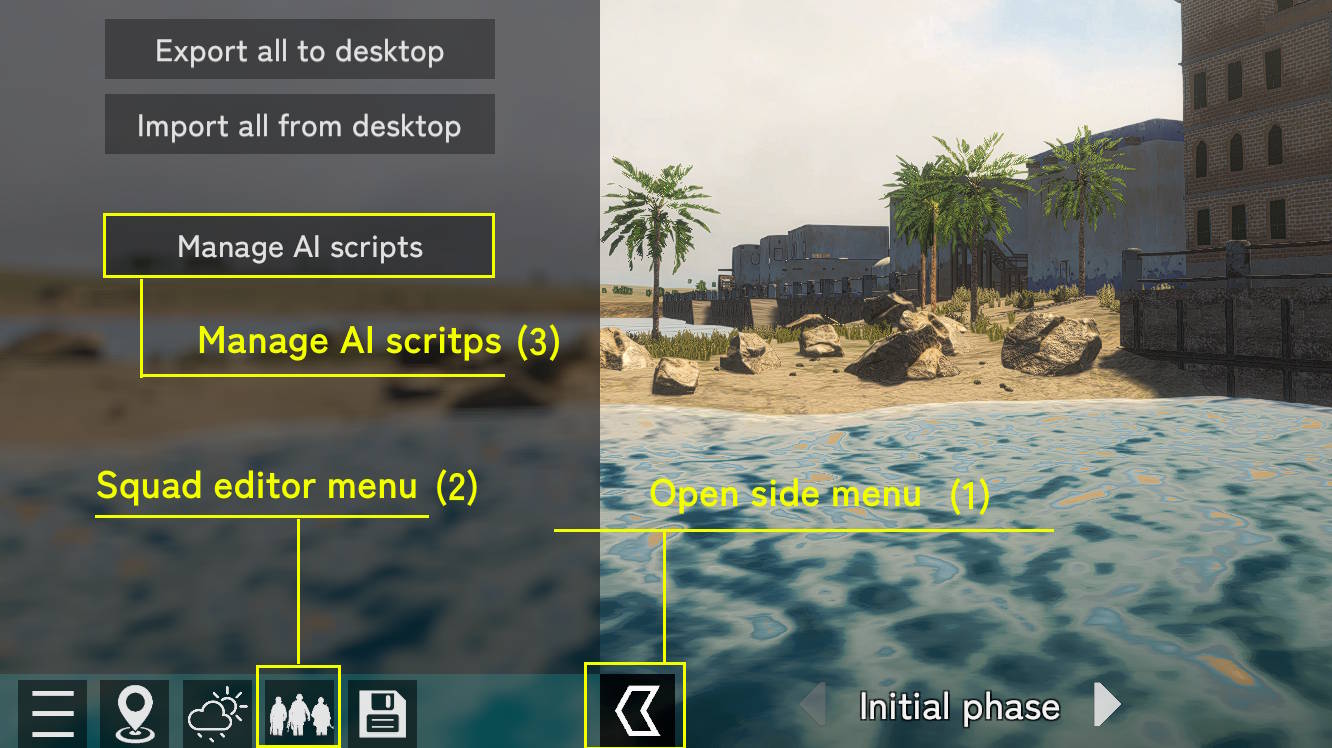
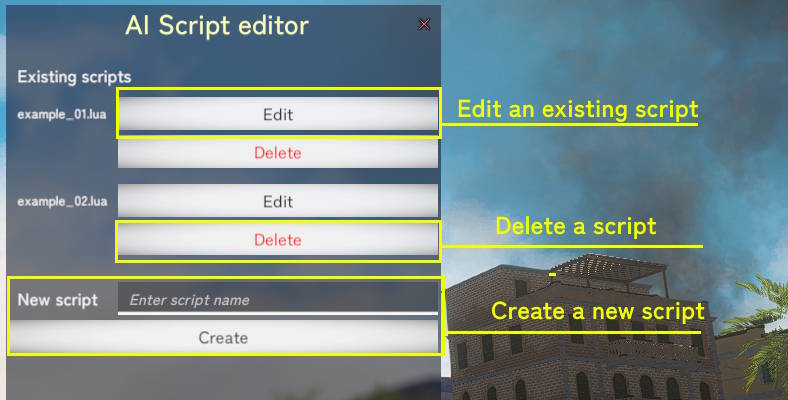
AI scripts can be assigned in two ways:
-
Assign via Squad Spawner: When a script is assigned to a squad spawner, it is automatically injected into every AI unit of that squad.
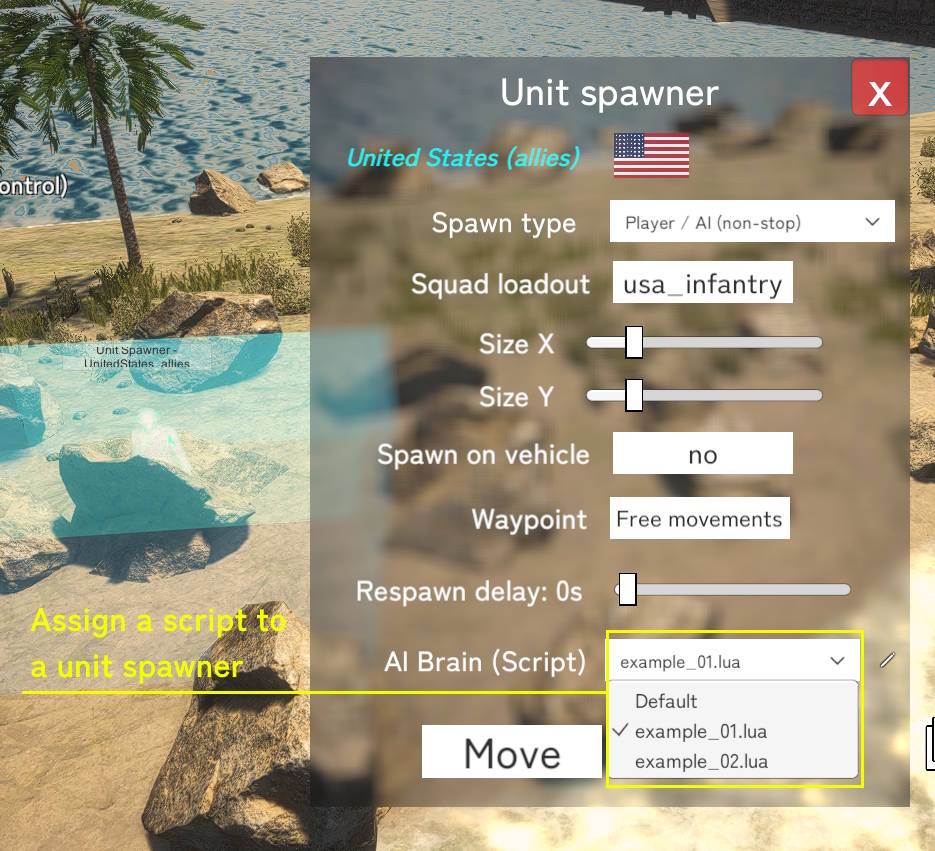
- Manual Assignment: You can also assign a script via Lua code when spawning a unit in a mission phase script.
For example, you might assign an AI script manually like this:
-- AI Script Assignment Example
--spawn an unit
local aiUnit = spawnSoldier(vec3(10,0,10), "England_allies", 0, "eng_infantry_gunner")
if aiUnit then
-- give the unit some lua script
aiUnit.setBrain("ai_patrol.lua")
endNote that the Id "eng_infantry_gunner" (and other vanilla loadout Ids) and the Faction Id "England_allies" (and other vanilla and modded squad Ids) can be acquired trough the Id tables section in the Script Settings menu.
AI scripts run locally on the owner’s machine. When using a squad spawner, the entire squad is owned by you so the script executes on your computer. However, AI squads are ultimately managed by the master client – including their Lua scripts.
Important: If a player leaves an online match, their units (and associated scripts) transfer to the master client, where the scripts will restart. It is therefore recommended to use the global class to verify whether certain operations should be skipped on a fresh run.
Like phase scripts, AI scripts are stored in their own subfolder within the mission folder, making them accessible for external editing.

A notable feature in soldier scripts is the myself() function, which returns a reference to the Soldier class instance running the script. This allows you to call specific soldier functions directly.
For example, a soldier script might look like this:
-- Get the unit which is running this script
local soldier = myself()
-- Make the unit play the VoiceClip.scream_long clip every 5 seconds while being alive
while sold.isAlive() do
sold.say(VoiceClip.scream_long)
sleep(5)
end